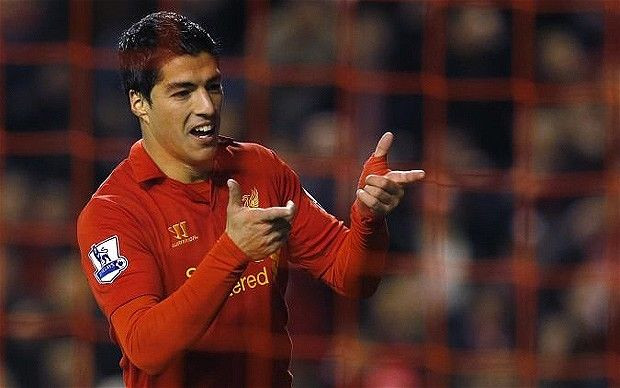Luis Suarez Bite Ban Doesn’t Add Up; Liverpool Forward Gets 10-Match Suspension For Biting Chelsea’s Branislav Ivanovic

OPINION
Let’s get one thing straight from the start: biting is a bizarre and disgusting practice to conduct in any walk of life once you progress past the age of a toddler. However, is it worse than stomping on an opponent? Debatable. Is it worse than racially abusing an opponent? I certainly hope for the sake of society that it isn’t.
Yet, by banning Liverpool forward Luis Suarez for 10 matches for biting Chelsea’s Branislav Ivanovic, the English Football Association has answered both those questions with a categorical yes.
Suarez is a repeat offender having also bitten an opponent when he played in the Eredivise, and even with less drastic examples has shown a worrying tendency to react in extreme ways in the desperation to succeed on the field. For those who are not fans of the club he plays for, he is one of the most irritating players witnessed in recent times. Liverpool, if they have not done so already, would be wise to get the player to seek counseling of some sort to resolve these issues that threaten to overshadow and lessen the career of one of the world’s best strikers.
But plenty has been said about Suarez’s problems. Instead, let’s focus on the FA’s reaction to Suarez’s latest indiscretion and the hysteria that appears to have fuelled it.
The origins of the reaction come from biting being seen as an act that has no place on the pitch, unlike say a knowingly reckless tackle, an intentional stomp, or even an elbow to the face.
All of the above mentioned offenses would be met with a three-match ban and all risk doing a lot more damage to an opponent than the bite Suarez gave Ivanovic, which didn't break the skin. The Serbian defender protested to the referee immediately following the bite, but continued to play the match without it seemingly bothering him too much.
But biting, like spitting, is not part of football. Now biting is clearly a step up from spitting, yet the reaction from much of the media and fans and subsequent punishment from the authorities involves a similar overreaction. It is inherently based on the idea that a violent tackle is at least the behaviors of a true man -- and only real men play football -- whereas spitting and biting are somehow worse because they are underhanded.
Glen Johnson, who was spat at by West Brom’s Goran Popov earlier this season suggested this point.
“You do something like this which is disgusting,” he said. “No man should be faced with that.”
And Suarez is the ultimate sly player, not just sneaky, but a "sneaky foreigner." It is hard not to think that Suarez being foreign and perhaps especially Latin American only adds to the outrage. South American journalist Fernando Duarte excellently explains the cultural stereotypes that have played into the narrative over Suarez even before he arrived in England (For those unaware, the stereotype was perhaps "best" and most unashamedly summed up by the WWE’s character for the late wrestler Eddie Guerrero, who played up his Latino heritage and embraced the attitude of “lie, cheat and steal.”).
During the 2010 World Cup, six months before he signed for Liverpool, Suarez was castigated for deliberately handling the ball on the line to prevent Ghana from scoring a goal to knock his Uruguay side out of the World Cup.
The reaction was ridiculous. It may have been an unpleasant way to deny an African team a place in the semifinals of the World Cup in their home continent, but it was also, surely, a natural inclination and ultimately smart strategy, as it helped lead Uruguay past Ghana into the last four.
Players are praised every week for making so-called “professional fouls” that knowingly prevent an opponent from having the opportunity to score. They are punished within the laws of the game -- as Suarez was.
Suarez is also castigated for a propensity for diving. It is extremely unsavory, but it’s also the same principle as appealing for a corner that you know you did not win. Yet, such actions are accepted as part of the game. Diving, though, was apparently only brought to English shores by those "dirty foreigners."
The Liverpool forward is also treated differently from British players. Gareth Bale, for instance, has been booked six times for diving since December 2011 but is not viewed in the same negative way as Suarez.
Perhaps the worse double standard, though, comes from the FA and their relative punishments for racist abuse and biting.
John Terry was handed a just a four-match ban last year for being found guilty by the FA of racially abusing Anton Ferdinand. Suarez, himself, was given double that for repeatedly being found to have racially abused Patrice Evra in 2011. It is surely beyond any right thinking individual to rationalize the merits of those bans put up against a 10-match suspension for Suarez’s latest indiscretion.
Europe’s governing body UEFA has proposed an automatic 10-match ban for racist abuse. Yet, even if that comes in across the board, the FA would still look ridiculous for putting it on the same level as biting. The one caveat for all this would be if the FA reveal in their written report that they employed some kind of totting up procedure on Suarez, although whether this would be appropriate for either a completely different form of offense, or the same offense committed under another country’s association is questionable.
While Suarez is guilty of repeatedly bringing the game into disrepute, the FA appears culpable of punishment based on the level of reaction to a misdemeanor rather than the severity of the act itself.
© Copyright IBTimes 2024. All rights reserved.





















